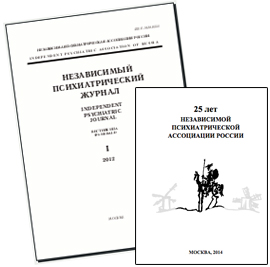Abstracts of №1, 2015
RUSSIAN PSYCHIATRY IN THE EPOCH OF DECLINE
Yu.S.Savenko
The main tendency of development of Russian psychiatry in the last 150 years is withstanding of police and humanistic psychiatry. With the example of using notions of “totalitarian sects” and “minority” were demonstrated methods of manipulations, which challenge our critical thinking. The author has been presented the panorama of the medical care reform in psychiatry, of crisis of scientific research, of juridical practice and expert activities, as well as attempts to withstand negative tendencies and obliviousness of the mathematic model that “optimization is a way to catastrophe”.
Key words: Russian psychiatry today, reform of Russian psychiatry, crisis of Russian psychiatry
ON THE EFFECT OF ENVIRONMENT ON PERSONALITY DEVELOPMENT
B.V.Voronkov (St.Petersburg)
The author expresses his position in regard to the role of the environment, education and the circumstances in development of the character, psychopathy and personality in general. The significance of congenital and acquired influences in the development of personality is discussed.
Key words: social disadaptation, character, personality disorder, environmental and biological factors.
METAPHYSICAL DISCOURSE OF PSYCHOTHERAPY
Yu.T.Dzhangildin
One of the fundamental components of an interdisciplinary paradigm of modern psychotherapy is dominant at a given stage of social development of the ideological concepts, to delineate the boundaries of personal meanings and answer the basic questions of human existence. Such spiritual and ideological ideas over several millennia evolved within religious discourse, which is quite substantial in psychotherapeutic models.
Key words: psychotherapeutic paradigm, Christianity, mechanisms of protection, coping strategies, the suffering, the raison d ‘ être.
ON DIAGNOSTICS AND PSYCHOTHERAPY OF PANIC ATTACKS
V.E.Smirnov, Yu.L.Pokrovsky
For many years 56 outpatients with panic attacks (PA), agoraphobia and other phobias were under observation. Comorbidity of those disorders with diseases of heart and vascular system and use of psychoactive substances was revealed. For the first time the complex of measures for rendering “first aid” in such cases was described. Catamnesis were retraces. The results of psychotherapy are not inferior to psychopharmacological treatment of panic attacks.
Key words: panic attacks, somatic neurological disorders, psychotherapy.
TREAT CAN NOT DISCHARGE
(On the validity of involuntary hospitalization to mental hospital of an unidentified person)
Yu.N.Argunova
The author deals with the question of admissibility of psychiatric care in hospital for a person without his consent, if his identity had not been ascertained. It is pointed out that this question was not regulated by the law, that leads to refusal of court to give permission for treatment a patient in mental facilities, leads to violation of the constitutional right of citizen to health care and medical aid. The practice in court including the European Human Rights Court is analyzed. Health bodies together with other departments should work out algorithm of organization of first psychiatry aid to persons without documents.
Key words: involuntary hospitalization, unidentified person
ON THE QUESTION OF PSYCHOPATHOLOGICAL MECHANISMS IN THE COMMISSION OF SERIOUS SOCIALLY DANGEROUS ACTS BY PATIENTS WITH SCHIZOPHRENIA
S.Z.Eshimbetova, B.R.Chembayev (Tashkent, Uzbekistan)
The mechanisms of commitment of serious socially dangerous acts were analyzed on the basis of study of 201 patients with schizophrenia who have committed these acts in disease state. The authors offered the division of psychopathological mechanisms into types depending on the core role in commitment of dangerous assaultive acts of positive or negative symptoms taking into account the influence of personality of patients.
Key words: schizophrenia, serious socially dangerous acts, psychopathological mechanisms, forensic psychiatry
VIEWS OF DOCTORS AND PATIENTS CONCERNING THE PURPOSE OF PSYCHIATRIC HOSPITAL ADMISSION
N.B.Zakharov, M.V.Zlokazova, A.G.Solov’ev (Kirov)
The article presents views of doctors and patients of a psychiatric hospital concerning the purpose of hospital admission. It is revealed that clinical improvement of patients’ condition is the determining factor for doctors, while for patients improvement of their quality of life plays a more significant role. The necessity to use methods of psychosocial therapy and rehabilitation for rapprochement of the members of the therapeutic process is emphasized herein, as it will help not only to optimize inpatient treatment, but also to develop performance criteria for treatment and rehabilitation.
Key words: purpose of hospital admission, psychiatric hospital, quality of life, social adaptation, rehabilitation effectiveness.
Legal and clinico-methodical problems of rendering first aid. Facts of abuse of psychiatry
V.C.Ivanov
Juridical practice of first psychiatric aid, non-observation of classic clinic-methodical rules of rendering first psychiatric aid, to impose on doctors obligations incompatible with qualifications of psychiatrist leads to violations of patient’s interests, his rights and to facts of abuse of psychiatry.
Keywords: first psychiatric aid, abuse of psychiatry
Once again on the problems of addiction medicine in Russia (in response to Prof. B.N. Piven)
A.G.Gofman, P.A.Ponizovskiy, T.A.Kozhinova, I.V.Yashkina
In response to Prof. B.N. Piven’s remarks the authors discuss possible reasons of alcohol addiction denial, some results of involuntary treatment of alcoholism in Soviet Union and certain dangers of introduction of substitution (replacement) therapy in Russia.
Keywords: denial of alcohol addiction, involuntary treatment, substitution therapy.



